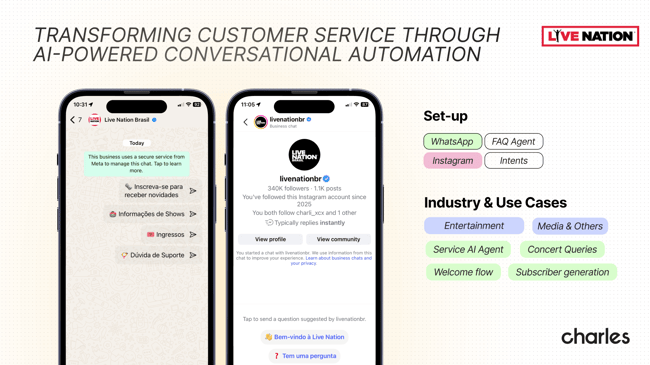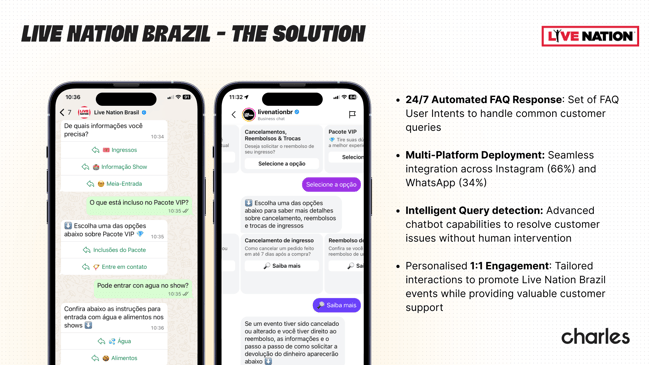Table of Contents
1. What is AI-powered customer engagement?
Key benefits
- 24/7 availability: AI agents can engage customers at any time.
- Scalability: Handle thousands of queries simultaneously without compromising quality.
- Cost efficiency: Reduce reliance on human agents for routine tasks.
Why WhatsApp?
With over 3 billion users worldwide, WhatsApp has become a vital channel for businesses. Its conversational nature makes it ideal for AI-powered engagement, enabling brands to connect with customers in real-time.
Today’s consumers expect brands to be available instantly, 24/7, and on their preferred channels. Conversational commerce delivers on that expectation — in a way that email, forms, or clunky websites can’t.
2. Why understanding customer intent is the foundation of engagement
At the heart of effective customer engagement lies a simple truth: you can’t engage your customers meaningfully unless you understand what they want. Every message a customer sends — whether it’s a question, complaint, or request — is an opportunity to understand their intent.

Why intent matters
- Personalization: Knowing what a customer wants allows you to tailor your responses and offers.
- Efficiency: When you understand intent, you can resolve issues faster and more accurately.
- Proactive engagement: Detecting buying signals or dissatisfaction early enables you to act before the customer disengages.

The challenge of scale
While understanding customer intent is straightforward in one-on-one interactions, it becomes exponentially harder as your business grows. Manually analyzing thousands of messages is not only time-consuming but also prone to errors. This is where AI steps in.
How AI bridges the gap
AI-powered agents can analyze customer messages in real-time, detect their intent, and respond accordingly. This eliminates the need for manual intervention in routine queries, freeing up human agents to focus on more complex tasks.
This brings us to user intent matching — the cornerstone of AI-powered customer engagement. By understanding and categorizing customer intents, businesses can automate responses, improve personalization, and scale their operations effortlessly.
2. Understanding user intent matching
User intent matching is the process of identifying the purpose behind a customer’s message. Whether it’s a simple FAQ, a service request, or a buying signal, AI can analyze messages and determine the appropriate response.
Examples of common intents
- Coupon requests: “Do you have a discount code?”
- FAQs: “What are your shipping options?”
- Buying signals: “Can I get more details about this product?”
- Service requests: “I need help with my order.”
By accurately identifying these intents, businesses can provide timely and relevant responses, improving customer satisfaction.
3. Detecting customer intents with AI
Detecting customer intents relies on advanced technologies like natural language processing (NLP) and machine learning. These tools analyze text, identify patterns, and classify messages into predefined categories.
How it works
- Message analysis: AI scans the customer’s message for keywords, tone, and context.
- Intent classification: The system matches the message to a specific intent (e.g., FAQ, complaint, or purchase inquiry).
- Response generation: Based on the intent, the AI either provides an automated response or escalates the query.

Real-world example
A customer messages, “Can I get a refund for my order?” The AI detects this as a service request and routes it to the support team with relevant context, ensuring faster resolution. 8 more uses cases for automated WhatsApp messages.
4. Automating FAQ responses on WhatsApp
One of the most impactful applications of AI in customer engagement is automating FAQ responses. By setting up predefined user intents, businesses can instantly address common queries.
How to set up automating FAQs on WhatsApp with charles
-
Upload your FAQ content
- Businesses start by uploading frequently asked questions and their corresponding answers into the charles platform. This data serves as the knowledge base for the AI agent.
- The more comprehensive the FAQ file, the better the AI agent can perform. For example, including detailed answers across multiple topics ensures the agent can address a wide range of customer queries.
-
Brand-infused personality and tone
- charles allows businesses to configure the AI agent’s tone of voice to align with their brand identity. This ensures that responses feel authentic and consistent with the brand’s communication style.
- Adjustments can be made to reflect a formal, friendly, or playful tone, depending on the target audience.

-
Context memory and fallback responses
- The AI agent is designed to retain context from previous customer messages, enabling it to provide more accurate and relevant responses.
- If the AI cannot find a matching answer in the knowledge base, it uses fallback mechanisms:
- A generic fallback message (e.g., “I’m sorry, I don’t have that information right now.”)
- A custom fallback response tailored to the brand’s needs.
-
A seamless handoffs from AI to human
- The AI agent is designed to retain context from previous customer messages, enabling it to provide more accurate and relevant responses.
-
Testing and optimization
- Before going live, businesses can test the FAQ agent’s responses to ensure accuracy and alignment with their brand.
- Over time, the agent’s performance can be monitored, and the FAQ file can be updated to address new or recurring customer queries.
4.1 Why this setup is effective
- Efficiency: Automating FAQs reduces the workload on customer service teams, allowing them to focus on more complex issues.
- Consistency: The AI agent ensures uniform responses across all customer interactions.
- Scalability: The system can handle thousands of queries simultaneously, making it ideal for businesses with high customer volumes.
- Personalization: By configuring the tone and context memory, businesses can create a conversational experience that feels tailored to each customer.
4.2 Case study: Live Nation Brazil
Live Nation Brazil integrated AI-powered FAQ responses on WhatsApp and Instagram. The results were impressive:
- 24/7 support: Customers received instant answers to queries about tickets, venues, and artists.
- Reduced workload: The community management team saved over 50 hours per month.
- Improved satisfaction: Personalized responses enhanced the customer experience.

4.3 Benefits of automating FAQs
- Speed: Provide instant answers to repetitive questions.
- Consistency: Ensure accurate and uniform responses.
- Scalability: Handle high volumes of inquiries without delays.

5. Handling sensitive topics with AI
While AI excels at automating responses, handling sensitive topics requires a more nuanced approach. Missteps in addressing these issues can lead to compliance risks or damage to brand reputation.
Challenges
- Legal risks: Providing medical, legal, or financial advice without proper expertise.
- Brand reputation: Mishandling sensitive queries can erode trust.
- Complexity: Some topics require human empathy and judgment.
AI’s role
AI can detect sensitive topics and escalate them to human agents. For example:
- A customer asks, “Can I use this product while pregnant?” The AI identifies this as a sensitive health-related query and routes it to a qualified expert.

Example scenarios
- Health & beauty: Questions about medical conditions or product safety.
- Legal compliance: Requests for GDPR-related actions like data deletion.
- Ethical concerns: Queries about controversial topics.
By defining custom rules, businesses can ensure AI avoids answering risky questions and instead facilitates a smooth handoff to human agents.
6. Ensuring seamless handoffs from AI to human
Seamless handoffs from AI to human agents are crucial for maintaining trust and delivering exceptional customer experiences, especially when handling sensitive or complex topics.
While AI excels at automating routine queries, it’s equally important to ensure that nuanced conversations are escalated to human agents smoothly and without disrupting the customer journey.
This balance between automation and human intervention safeguards brand reputation and ensures compliance.
Detecting sensitive topics
- AI is programmed to instantly recognize risky or sensitive conversation topics, such as legal, medical, or compliance-related queries.
- When such topics are detected, the AI prevents itself from responding and instead routes the conversation to a human expert.

Smart handoff with custom rules
- Businesses can define specific topics or scenarios where AI should not respond.
- These rules ensure that sensitive or complex queries are escalated to human agents seamlessly.
- This approach protects brand reputation and ensures compliance with legal and ethical standards.
Smooth human escalation
- AI detects signals where a human agent is needed (e.g., “Can I speak to a real human?” or “This doesn’t solve my problem yet”).
- The system escalates the conversation to a human while maintaining the context of the interaction, ensuring continuity and avoiding customer frustration.
Natural conversation continuity
- Even when escalating to a human, the AI ensures the conversation flow remains smooth.
- For example, if a customer asks a sensitive question, the AI responds with a compliant answer (e.g., “I can’t provide medical advice, but I’ll connect you with someone who can help”) before routing to a human.
7. Overcoming challenges in AI-powered engagement
While AI offers numerous advantages, businesses must address certain challenges to maximize its potential.
The AI agent dilemma
AI agents are powerful but lack human judgment. For instance:
- They may answer sensitive questions incorrectly.
- They might struggle with nuanced or emotional queries.
Solutions
- Custom rules: Define what AI can and cannot answer.
- Human escalation: Ensure a seamless handoff for complex topics.
- Regular training: Continuously improve AI models with real-world data.
Ensuring compliance
AI must adhere to regulations like GDPR. This includes:
- Handling opt-out requests promptly.
- Protecting customer data.
- Providing transparent communication.
8. Best practices for implementing AI in customer engagement
To successfully implement AI-powered tools, businesses should follow these best practices:
-
Define clear objectives
- Identify the key problems AI will solve, such as automating FAQs, improving response times, or enhancing personalization.
- Clear goals help align AI implementation with business outcomes.
-
Train AI Agents
- Use diverse datasets to improve the accuracy and reliability of AI responses.
- Ensure the data reflects real-world scenarios and customer queries to minimize errors.
-
Monitor performance
- Regularly review AI interactions to ensure quality and relevance.
- Analyze metrics like response accuracy, resolution times, and customer satisfaction to identify areas for improvement.
-
Prioritize human oversight
- Always have a human backup for complex or sensitive queries.
- Seamless escalation to human agents ensures customers receive the right support when AI reaches its limitations.
-
Focus on personalization
- Tailor responses to individual customer needs by leveraging customer data and context.
- Personalization enhances the customer experience and builds stronger relationships.
-
Ensure clean and structured data
- High-quality, clean data is the foundation of effective AI agents.
- Inconsistent or incomplete data can lead to inaccurate responses and poor customer experiences.
- Businesses must invest in data hygiene practices, such as regular updates, deduplication, and validation, to maintain a reliable knowledge base.
-
Develop a data strategy
- A successful AI implementation requires a clear strategy for managing and utilizing data.
- Define how data will be collected, stored, and updated to ensure the AI agent remains accurate and relevant over time.
- Align the data strategy with business goals to maximize the value of AI-powered tools.
By following these best practices, businesses can unlock the full potential of AI-powered customer engagement while ensuring their AI agents remain accurate, reliable, and aligned with their brand values.
9. Future of AI in customer engagement
The future of AI in customer engagement is bright, with several exciting trends on the horizon:
- Omnichannel integration: AI will seamlessly connect interactions across platforms like WhatsApp, Instagram, and email.
- Hyper-personalization: Advanced algorithms will deliver even more tailored experiences.
- Proactive engagement: AI will predict customer needs and initiate conversations based on signals.
As AI continues to evolve, businesses that embrace these innovations will gain a competitive edge.
Conclusion
AI-powered customer engagement is revolutionizing the way businesses interact with their customers. From detecting user intents to automating FAQs and handling sensitive topics, AI enables companies to deliver faster, smarter, and more personalized service.
If you’re ready to transform your customer engagement strategy, charles can help. Our conversational AI and CRM tools empower businesses to attract, convert, and retain customers with ease. Contact us today to learn more.
FAQs
What is user intent matching in WhatsApp?
User intent matching involves identifying the purpose behind a customer’s message to provide relevant responses or actions.
How does AI handle sensitive topics in customer conversations?
AI detects sensitive topics and escalates them to human agents, ensuring compliance and brand safety.
What are the benefits of automating FAQ responses with AI?
Automation provides instant, consistent answers, reduces workload, and improves customer experience.
How do I ensure compliance when using AI for customer engagement?
Follow regulations like GDPR, define clear rules for AI, and prioritize data security.


